- Home
- Richard Wright
The Man Who Was Almost a Man
The Man Who Was Almost a Man Read online
RICHARD WRIGHT
(1908-1960)
"The Man Who Was Almost a Man" contrasts with, and in an oblique way amplifies, Langston Hughes's "Red-Headed Baby": for here we see a further development of certain thematic tensions, the logical, if unarticulated, next step. Its setting would seem to bear a close resemblance to the rural area near Natchez, Mississippi, where Wright was born to extreme poverty, familial disruption, and the violent bigotry of whites.
Like Zora Neale Hurston and Langston Hughes, Richard Wright left the South permanently. He too worked for the Writers' Project and did various freelance journalism; by 1935, he had started to write fiction, strongly influenced by the literary Naturalism of the era. The publication of the original and disturbing Native Son in 1940 was a turning point in black American literary history, for the novel was unaccommodating in its portrayal of a vengeful black youth named Bigger Thomas, yet it became a bestseller, bought and read by a large audience of white readers. Bigger Thomas as character and symbol entered the American consciousness permanently, as a daemonic counterpart, it might be said, to Samuel Clemens' long-suffering Nigger Jim and Harriet Beecher Stowe's Christly Uncle Tom.
Long associated with Marxist ideology, Richard Wright is nonetheless an artist of complexity and subtlety, as the story included here demonstrates. Apart from Native Son, Wright's important titles are the stories Uncle Tom's Children (1938), the autobiographical Black Boy (1945), and the novel The Outsider (1953). An early novel, Lawd Today, was published posthumously; and a gathering of stories, Eight Men, from which "The Man Who Was Almost a Man" is taken, appeared in 1961.
* * *
The Man Who Was Almost a Man
Dave struck out across the fields, looking homeward through paling light. Whut's the use talkin wid em niggers in the field? Anyhow, his mother was putting supper on the table. Them niggers can't understan nothing. One of these days he was going to get a gun and practice shooting, then they couldn't talk to him as though he were a little boy. He slowed, looking at the ground. Shucks, Ah ain scareda them even ef they are biggern me! Aw, Ah know whut Ahma do. Ahm going by ol Joe's sto n git that Sears Roebuck catlog n look at them guns. Mebbe Ma will lemme buy one when she gits mah pay from ol man Hawkins. Ahma beg her t gimme some money. Ahm ol ernough to hava gun. Ahm seventeen. Almost a man. He strode, feeling his long loose-jointed limbs. Shucks, a man oughta hava little gun aftah he done worked hard all day.
He came in sight of Joe's store. A yellow lantern glowed on the front porch. He mounted steps and went through the screen door, hearing it bang behind him. There was a strong smell of coal oil and mackerel fish. He felt very confident until he saw fat Joe walk in through the rear door, then his courage began to ooze.
"Howdy, Dave! Whutcha want?"
"How yuh, Mistah Joe? Aw, Ah don wanna buy nothing. Ah jus wanted t see ef yuhd lemme look at tha catlog erwhile."
"Sure! You wanna see it here?"
"Nawsuh. Ah wants t take it home wid me. Ah'll bring it back termorrow when Ah come in from the fiels."
"You plannin on buying something?"
"Yessuh."
"Your ma lettin you have your own money now?"
"Shucks. Mistah Joe, Ahm gittin t be a man like anybody else!"
Joe laughed and wiped his greasy white face with a red bandanna.
"What you plannin on buyin?"
Dave looked at the floor, scratched his head, scratched his thigh, and smiled. Then he looked up shyly.
"Ah'll tell yuh, Mistah Joe, ef yuh promise yuh won't tell."
"I promise."
* * *
"Waal, Ahma buy a gun."
"A gun? What you want with a gun?"
"Ah wanna keep it."
"You ain't nothing but a boy. You don't need a gun."
"Aw, lemme have the catlog, Mistah Joe. Ah'll bring it back."
Joe walked through the rear door. Dave was elated. He looked around at barrels of sugar and flour. He heard Joe coming back. He craned his neck to see if he were bringing the book. Yeah, he's got it. Gawddog, he's got it!
"Here, but be sure you bring it back. It's the only one I got."
"Sho, Mistah Joe."
"Say, if you wanna buy a gun, why don't you buy one from me? I gotta gun to sell."
"Will it shoot?"
"Sure it'll shoot."
"Whut kind is it?"
"Oh, it's kinda old ... a left-hand Wheeler. A pistol. A big one."
"Is it got bullets in it?"
"It's loaded."
"Kin Ah see it?"
"Where's your money?"
"What yuh wan fer it?"
"I'll let you have it for two dollars."
"Just two dollahs? Shucks, Ah could buy tha when Ah git mah
pay."
"I'll have it here when you want it."
"Awright, suh. Ah be in fer it."
He went through the door, hearing it slam again behind him. Ahma git some money from Ma n buy me a gun! Only two dollahs! He tucked the thick catalogue under his arm and hurried.
"Where yuh been, boy?" His mother held a steaming dish of black-eyed peas.
"Aw, Ma, Ah just stopped down the road t talk wid the boys."
"Yuh know bettah t keep suppah waiting."
He sat down, resting the catalogue on the edge of the table.
"Yuh git up from there and git to the well n wash yosef ! Ah ain feedin no hogs in mah house!"
She grabbed his shoulder and pushed him. He stumbled out of the room, then came back to get the catalogue.
* * *
"Whut this?"
"Aw, Ma, it's jusa catlog."
"Who yuh git it from?"
"From Joe, down at the sto."
"Waal, thas good. We kin use it in the outhouse."
"Naw, Ma." He grabbed for it. "Gimme ma catlog, Ma."
She held onto it and glared at him.
"Quit hollerin at me! Whut's wrong wid yuh? Yuh crazy?"
"But Ma, please. It ain mine! It's Joe's! He tol me t bring it back t im termorrow."
She gave up the book. He stumbled down the back steps, hugging the thick book under his arm. When he had splashed water on his face and hands, he groped back to the kitchen and fumbled in a corner for the towel. He bumped into a chair; it clattered to the floor. The catalogue sprawled at his feet. When he had dried his eyes he snatched up the book and held it again under his arms. His mother stood watching him.
"Now, ef yuh gonna act a fool over that ol book, Ah'll take it n burn it up."
"Naw, Ma, please."
"Waal, set down n be still!"
He sat down and drew the oil lamp close. He thumbed page after page, unaware of the food his mother set on the table. His father came in. Then his small brother.
"Whutcha got there, Dave?" his father asked.
"Jusa catlog," he answered, not looking up.
"Yeah, here they is!" His eyes glowed at blue-and-black revolvers. He glanced up, feeling sudden guilt. His father was watching him. He eased the book under the table and rested it on his knees. After the blessing was asked, he ate. He scooped up peas and swallowed fat meat without chewing. Buttermilk helped to wash it down. He did not want to mention money before his father. He would do much better by cornering his mother when she was alone. He looked at his father uneasily out of the edge of his eye.
"Boy, how come yuh don quit foolin wid tha book n eat yo sup-pah?"
"Yessuh."
"How you n ol man Hawkins gitten erlong?"
"Suh?"
"Can't yuh hear? Why don yuh listen? Ah ast you how wuz yuh n ol man Hawkins gittin erlong?"
* * *
"Oh, swell, Pa. Ah plows mo lan than anybody over there."
"Waal, yuh
oughta keep you mind on whut yuh doin."
"Yessuh."
He poured his plate full of molasses and sopped it up slowly with a chunk of cornbread. When his father and brother had left the kitchen, he still sat and looked again at the guns in the catalogue, longing to muster courage enough to present his case to his mother. Lawd, ef Ah only had tha pretty one! He could almost feel the slickness of the weapon with his fingers. If he had a gun like that he would polish it and keep it shining so it would never rust. N Ah'd keep it loaded, by Gawd!
"Ma?" His voice was hesitant.
"Hunh?"
"01 man Hawkins give yuh mah money yit?"
"Yeah, but ain no usa yuh thinking about throwin nona it erway. Ahm keeping tha money sos yuh kin have does t go to school this winter. "
He rose and went to her side with the open catalogue in his palms. She was washing dishes, her head bent low over a pan. Shyly he raised the book. When he spoke, his voice was husky, faint.
"Ma, Gawd knows Ah wans one of these."
"One of whut?" she asked, not raising her eyes.
"One of these," he said again, not daring even to point. She glanced up at the page, then at him with wide eyes.
"Nigger, is yuh gone plumb crazy?"
"Aw, Ma—"
"Git outta here! Don yuh talk t me bout no gun! Yuh a fool!"
"Ma, Ah kin buy one fer two dollahs."
"Not ef Ah knows it, yuh ain!"
"But yuh promised me one—"
"Ah don care what Ah promised! Yuh ain nothing but a boy yit!"
"Ma ef yuh lemme buy one Ah'll never ast yuh fer nothing no mo."
"Ah tol yuh t git outta here! Yuh ain gonna toucha penny of tha money fer no gun! Thas how come Ah has Mistah Hawkins t pay yu wages t me, cause Ah knows yuh ain got no sense."
"But, Ma, we needa gun. Pa ain got no gun. We needa gun in the house. Yuh kin never tell whut might happen."
"Now don yuh try to maka fool outta me, boy! Ef we did hava gun, yuh wouldn't have it!"
* * *
He laid the catalogue down and slipped his arm around her waist.
"Aw, Ma, Ah done worked hard alla summer n ain ast yuh fer nothing, is Ah, now?"
"Thas whut yuh spose t do!"
"But Ma, Ah wans a gun. Yuh kin lemme have two dollahs outta mah money. Please, Ma. I kin give it to Pa . . . Please, Ma! Ah loves yuh, Ma."
When she spoke her voice came soft and low.
"What yu wan wida gun, Dave? Yuh don need no gun. Yuh'll git in trouble. N ef yo pa jus thought Ah let yuh have money t buy a gun he'd hava fit."
"Ah'll hide it, Ma. It ain but two dollahs."
"Lawd, chil, whut's wrong wid yuh?"
"Ain nothin wrong, Ma. Ahm almos a man now. Ah wans a gun."
"Who gonna sell yuh a gun?"
"Ol Joe at the sto."
"N it don cos but two dollahs?"
"Thas all, Ma. Jus two dollahs. Please, Ma."
She was stacking the plates away; her hands moved slowly, reflectively. Dave kept an anxious silence. Finally, she turned to him.
"Ah'll let yuh git tha gun ef yuh promise me one thing."
"Whut's tha, Ma?"
"Yuh bring it straight back t me, yuh hear? It be fer Pa."
"Yessum! Lemme go now, Ma."
She stooped, turned slightly to one side, raised the hem of her dress, rolled down the top of her stocking, and came up with a slender wad of bills.
"Here," she said. "Lawd knows yuh don need no gun. But yer pa does. Yuh bring it right back t me, yuh hear? Ahma put it up. Now ef yuh don, Ahma have yuh pa lick yuh so hard yuh won fergit it."
"Yessum."
He took the money, ran down the steps, and across the yard.
"Dave! Yuuuuu Daaaaave!"
He heard, but he was not going to stop now. "Naw, Lawd!"
The first movement he made the following morning was to reach under his pillow for the gun. In the gray light of dawn he held it loosely, feeling a sense of power. Could kill a man with a gun like
* * *
this. Kill anybody, black or white. And if he were holding his gun in his hand, nobody could run over him; they would have to respect him. It was a big gun, with a long barrel and a heavy handle. He raised and lowered it in his hand, marveling at its weight.
He had not come straight home with it as his mother had asked; instead he had stayed out in the fields, holding the weapon in his hand, aiming it now and then at some imaginary foe. But he had not fired it; he had been afraid that his father might hear. Also he was not sure he knew how to fire it.
To avoid surrendering the pistol he had not come into the house until he knew that they were all asleep. When his mother had tiptoed to his bedside late that night and demanded the gun, he had first played possum; then he had told her that the gun was hidden outdoors, that he would bring it to her in the morning. Now he lay turning it slowly in his hands. He broke it, took out the cartridges, felt them, and then put them back.
He slid out of bed, got a long strip of old flannel from a trunk, wrapped the gun in it, and tied it to his naked thigh while it was still loaded. He did not go in to breakfast. Even though it was not yet daylight, he started for Jim Hawkins' plantation. Just as the sun was rising he reached the barns where the mules and plows were kept. .
"Hey! That you, Dave?"
He turned. Jim Hawkins stood eying him suspiciously.
"What're yuh doing here so early?"
"Ah didn't know Ah wuz gittin up so early, Mistah Hawkins. Ah was fixin t hitch up ol Jenny n take her t the fiels."
"Good. Since you're so early, how about plowing that stretch down by the woods?"
"Suits me, Mistah Hawkins."
"O.K. Go to it!"
He hitched Jenny to a plow and started across the fields. Hot dog! This was just what he wanted. If he could get down by the woods, he could shoot his gun and nobody would hear. He walked behind the plow, hearing the traces creaking, feeling the gun tied tight to his thigh.
When he reached the woods, he plowed two whole rows before he decided to take out the gun. Finally, he stopped, looked in all directions, then untied the gun and held it in his hand. He turned to the mule and smiled.
* * *
"Know whut this is, Jenny? Naw, yuh wouldn know! Yuhs jusa ol mule! Anyhow, this is a gun, n it kin shoot, by Gawd!"
He held the gun at arm's length. Whut t hell, Ahma shoot this thing! He looked at Jenny again.
"Lissen here, Jenny! When Ah pull this ol trigger, Ah don wan yuh to run n acka fool now?"
Jenny stood with head down, her short ears pricked straight. Dave walked off about twenty feet, held the gun far out from him at arm's length, and turned his head. Hell, he told himself, Ah ain afraid. The gun felt loose in his fingers; he waved it wildly for a moment. Then he shut his eyes and tightened his forefinger. Bloom! A report half deafened him and he thought his right hand was torn from his arm. He heard Jenny whinnying and galloping over the field, and he found himself on his knees, squeezing his fingers hard between his legs. His hand was numb; he jammed it into his mouth, trying to warm it, trying to stop the pain. The gun lay at his feet. He did not quite know what had happened. He stood up and stared at the gun as though it were a living thing. He gritted his teeth and kicked the gun. Yuh almos broke mah arm! He turned to look for Jenny; she was far over the fields, tossing her head and kicking wildly.
"Hol on there, ol mule!"
When he caught up with her she stood trembling, walling her big white eyes at him. The plow was far away; the traces had broken. Then Dave stopped short, looking, not believing. Jenny was bleeding. Her left side was red and wet with blood. He went closer. Lawd, have mercy! Wondah did Ah shoot this mule? He grabbed for Jenny's mane. She flinched, snorted, whirled, tossing her head.
"Hol on now! Hol on."
Then he saw the hole in Jenny's side, right between the ribs. It was round, wet, red. A crimson stream streaked down the front leg, flowing fast. Good Gawd! Ah wuzn't shootin at tha mule. He felt p
anic. He knew he had to stop that blood, or Jenny would bleed to death. He had never seen so much blood in all his life. He chased the mule for half a mile, trying to catch her. Finally she stopped, breathing hard, stumpy tail half arched. He caught her mane and led her back to where the plow and gun lay. Then he stooped and grabbed handfuls of damp black earth and tried to plug the bullet hole. Jenny shuddered, whinnied, and broke from him.
* * *
"Hol on! Hol on now!"
He tried to plug it again, but blood came anyhow. His fingers were hot and sticky. He rubbed dirt into his palms, trying to dry them. Then again he attempted to plug the bullet hole, but Jenny shied away, kicking her heels high. He stood helpless. He had to do something. He ran at Jenny; she dodged him. He watched a red stream of blood flow down Jenny's leg and form a bright pool at her feet.
"Jenny . . . Jenny," he called weakly.
His lips trembled. She's bleeding t death! He looked in the direction of home, wanting to go back, wanting to get help. But he saw the pistol lying in the damp black clay. He had a queer feeling that if he only did something, this would not be; Jenny would not be there bleeding to death.
When he went to her this time, she did not move. She stood with sleepy, dreamy eyes; and when he touched her she gave a low-pitched whinny and knelt to the ground, her front knees slopping in blood.
"Jenny . . . Jenny . . ." he whispered.
For a long time she held her neck erect; then her head sank, slowly. Her ribs swelled with a mighty heave and she went over.
Dave's stomach felt empty, very empty. He picked up the gun and held it gingerly between his thumb and forefinger. He buried it at the foot of a tree. He took a stick and tried to cover the pool of blood with dirt—but what was the use? There was Jenny lying with her mouth open and her eyes walled and glassy. He could not tell Jim Hawkins he had shot his mule. But he had to tell something. Yeah, Ah'll tell em Jenny started gittin ill n fell on the joint of the plow. . . . But that would hardly happen to a mule. He walked across the field slowly, head down.
It was sunset. Two of Jim Hawkins' men were over near the edge of the woods digging a hole in which to bury Jenny. Dave was surrounded by a knot of people, all of whom were looking down at the dead mule.

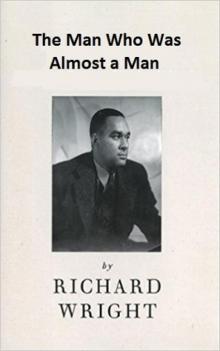 The Man Who Was Almost a Man
The Man Who Was Almost a Man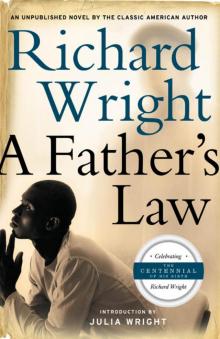 A Father's Law
A Father's Law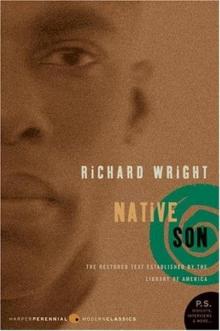 Native Son
Native Son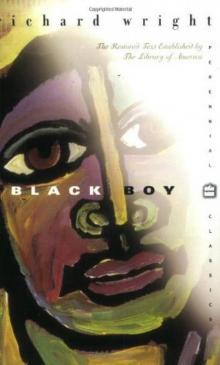 Black Boy
Black Boy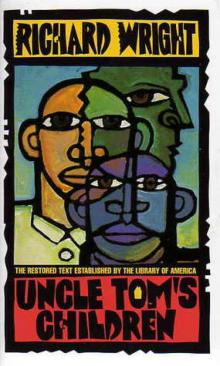 Uncle Tom's Children
Uncle Tom's Children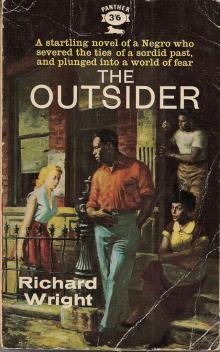 The Outsider
The Outsider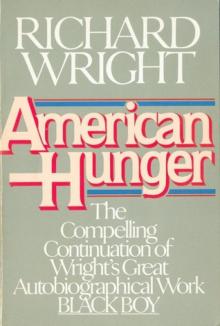 American Hunger
American Hunger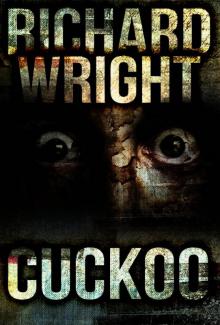 Cuckoo
Cuckoo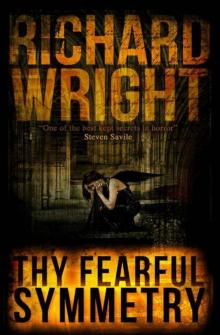 Thy Fearful Symmetry
Thy Fearful Symmetry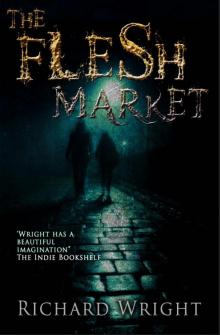 The Flesh Market
The Flesh Market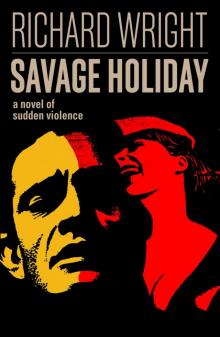 Savage Holiday
Savage Holiday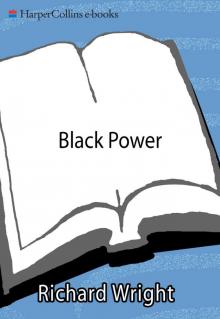 Black Power
Black Power